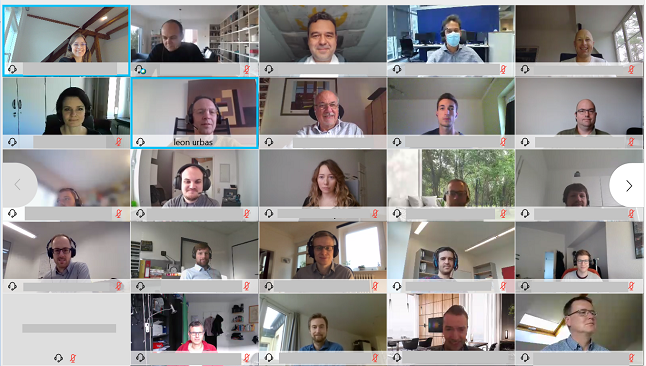On 25.11.2020 the second project meeting took place as a web conference that included presentations with outstanding results from the seven subprojects. Among the 21 speakers from industry and science, also five PhD students were involved.
The great potential of machine learning (ML) methods in the field of fluid property data was demonstrated by TU Kaiserslautern (LTD), Fraunhofer ITWM, and DDBST GmbH: they presented hybrid approaches that combine matrix completion methods with physical prediction methods and pure component descriptors and thereby yield significant improvements in the prediction of limiting activity coefficients. Further achievements were reported regarding the applicability of AI in kinetic modelling and flowsheet simulations. Capital-Gain Consultants (CGC) exemplarily showed for a Pre-Reformer Reactor how an artificial neural network (ANN) is used as interpolated data of a factorial design to estimate the influence of input parameters on output parameters.
In the area of process optimisation, ML is tested for the automation of batch phase detection which involves the improvement of data pre-processing and feature extraction. In addition, an AI-driven optimization, monitoring, and decision support for batch plants is currently under development. An AI-approach by TU Dortmund may be promising for being applied as a soft sensor for the detection of operating states in liquid-liquid extraction columns from image data.
In engineering, AI methods may support the planning process in the future. They are currently tested for pattern recognition in P&ID flowsheets, which are available in DEXPI format. The aim is to develop AI-based proposal algorithms for equipment and piping components with subsequent consistency checks. Michael Wiedau, chairman of the DEXPI Initiative, praised the approach and invited the speaker to one of the upcoming DEXPI events.
The first session after lunch break was dedicated to the implementation of a data platform. René Jäkel from the Center for Scalable Data Analytics and Artificial Intelligence (ScaDS.AI) presented the first version of the KEEN data platform, which will initially be tested for the KEEN internal use. Dr. Sonja Schimmler from Fraunhofer Fokus was invited as a guest speaker, who presented NFDI4cat and the planned activities in the area of data infrastructures. In the following discussion several similarities were identified and a further cooperation was mutually confirmed.
Finally, the concept of business model development and the KEEN Hackathon, which will take place as part of the ACHEMA Innovation Challenge, were announced. Robert Gremse from the German Aerospace Center (DLR) and Tom Kraus from the Institute for Innovation and Technology (iit) in the VDI/VDE Innovation und Technik GmbH praised the successful event and congratulated the consortium on a successful first half year.

DECHEMA e.V.